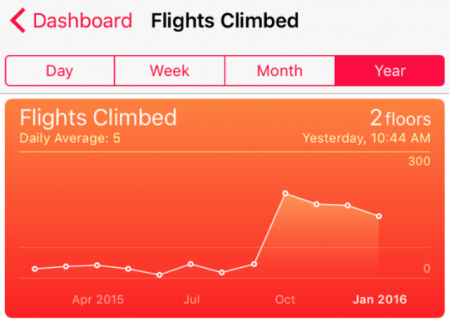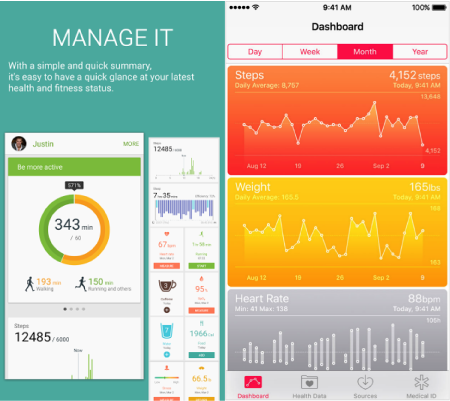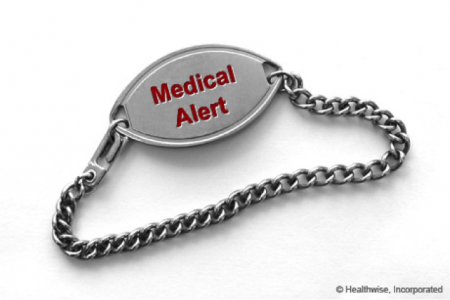
The Health Tracker You Already Own (and How It May Save Your Life)
- Chances are you already have one of the best health trackers on the market in your pocket
- Get convenient, real-time fitness and health tracking with no extra gadgets and little effort
- Double your chances of surviving a medical emergency by combing new and old technology.
Dear Reader,
“Whoa, I had no idea.”
“Yeah, me either. And it seems to be pretty on target. I counted seven flights of stairs today. Why the heck did I pay $100 for a fitness tracker when I already had one?”
This is a conversation Jasmine LeMaster, head of Living Well’s quality assurance, and I had a few weeks ago.
We were discussing fitness and health trackers. We were both surprised to find a seemingly accurate and extensive amount of fitness data on a device just about everyone already owns.
In fact, it was so accurate, I instantly became irritated with myself for spending $100 for a fitness tracker on the same day I bought the other device.
I will explain how to utilize it in just a bit.
First, I want to explain what I found.
There’s an App for That
I had just opened to the Health app on my iPhone, and to my surprise, there were comprehensive fitness data stored in it.
And not just for that day, but since Feb. 14, 2015, the day I bought my phone.
I was kind of shocked by the accuracy of the records. Let me share an example.
I lived in Memphis until the end of September 2015. While living there, I commuted to work by car and lived on the first floor of my apartment building.
When I moved to Baltimore, I started walking to work (where I climb up and down several sets of stairs every day), and my apartment is now on the second floor.
The changes in my daily routine are clearly reflected in my health dashboard’s yearly averages.
Check out the differences:

As you can see, I went from walking very few flights of stairs weekly to many flights exactly at the time I moved. It even reflects the extra flights I put in during October while I was still moving in.
The Apple Health app can only record fitness data if your phone is on you. By on you, I mean in your pocket, in your purse, or even in your hand.
Had I known this, I would have kept my phone on me more often. I feel that my daily averages are not as exact as they could be, but that is my own fault. Due to my habit of leaving my phone at my desk or on the kitchen counter for hours, the app couldn’t record all of my fitness data.
However, even with my neglectful ways, I feel that my daily habits were well represented.
But there is more good news for those of you who would rather not be strapped to your phones. Apple Health app will sync with the Apple Watch and other trackers, like Fitbit.
This way, the app can hold all of your fitness data, even when you go without your phone.
Sleep, for example maybe a better fit for a health tracker, since they don’t emit light and are attached to your body. These two factors may lead to better sleep and more accurate sleep readings.
I now use my health tracker for sleeping and workouts that are too intense to carry a phone.
I should mention you may have to download an app to make the sync work, depending on the tracker. This can cost a little bit of money ($0.99–2.99) — a tiny investment compared with the price you have already paid for most fitness trackers.
Apple isn’t alone in the health application world. Android users have access to S Health.
While I don’t have an Android phone, I was able to check it out S Health on a friend’s phone.
S Health tracks similar data to the Apple Health and, in my opinion, is user-friendly, and its dashboard was easier for me to read than Apple’s.
Check out the comparison:

Left: S Health dashboard photo: www.apkdigg.co
Right: Apple Health dashboard. Photo: Apple.com
You can change the data on your dashboards to what is most relevant to your health quest. On my dashboard, I have steps, flights of stairs, and weight. These three categories I check most often, as I am trying to ditch some holiday pounds, so it is convenient to have them on my dashboard.
With both apps, you are able to input valuable health data. This includes anything from height, weight, caloric intake to even health stats like blood pressure, lab results, and UV exposure. Some of this information may be a little too specific for your daily dashboard but is worth taking the few minutes to store.
These health stats are good to have on hand in case of a medical emergency or if you are changing health care providers. Let’s be clear, though: Information recorded in your phone is not a replacement for your actual medical records. Instead, it’s a helpful tool for you to track your health progress.
For instance, if you are diabetic, this is a good way to track your glucose levels. Also, this provides an ongoing record to see if your levels change over time. It may be helpful to share this information with your physician.
While all of these features are helpful, there is a feature that could truly save your life.
Replacing the Bracelet
Remember medical ID bracelets?

You know, the accessory that has your medical information on it?
Well, smartphones are providing the same service these days.
Apple Health has a Medical ID feature where you can input crucial health information like your emergency contacts, blood type, medical conditions, and allergies.
Since most of us don’t leave home without our phones these days, this feature could help prevent medical errors and reach your loved ones quickly in an emergency situation.
In fact, these apps are becoming so popular, emergency medical technicians (EMTs) in Michigan and Wisconsin are being trained to look for the Medical ID on iPhones.
The Medical ID feature is accessed from the emergency screen of your iPhone. If you have an iPhone, you can set your emergency information in the Health app by opening the Medical ID icon.
S Health does not have this emergency feature within the app.
However, Android does have a free app called ICE (which stands for “In Case of Emergency”) that will provide the same information in the event of an emergency. You can find it here.
Keep in mind, wearing a bracelet and having your Medical ID stored in your phone will double your chances of accurate medical attention during an emergency.
Since phones can lose power and/or be broken during an emergency situation, a medical bracelet is a smart backup.
If you have a fitness app you prefer to either of these, let me know all about it! nmoore@lfb.org
Live well,

Natalie Moore
Managing editor, Living Well Daily
P.S. If having your health monitored by your phone is a little too Big Brother for you, you can easily turn your health tracking off. Just go to your settings menu, find the health app, and turn it off. Simple as that.
Written By Natalie Moore
Natalie Moore is a dedicated health researcher with a passion for finding healthy, natural, and science-based solutions. After a decade of direct healthcare experience in western and natural medicine, she was involved in public health research before joining Living Well Daily.
View More Free Articles
Can't Shake Negative Thoughts? Check Your GUT First
Everyone struggles sometimes to stay positive or see the bright side of things. It’s part of being human. You might think those negative thoughts start in your brain—but it’s more complicated than that. A simple change to your daily habit can help dial down those negative feelings. New research suggests that this simple strategy could...
Repair Your Gut Barrier With the “Sunshine Cure”
Happy Fourth of July! As you celebrate with sunshine, good food, and great company, don’t forget—those summer rays aren’t just lifting your spirits… they’re also working behind the scenes to protect your gut and boost your health. Your gut health is more important than most people realize. It directly affects your overall well-being—from immunity to...
The 5 Health Numbers Your Doctor Wishes You'd Track
Have you ever been told you should “advocate” for yourself when it comes to your healthcare and wondered what that really means? It’s not just a buzzword—it’s a powerful concept that empowers you to take charge of your own health journey. In fact, it could save your life. Being your own best health advocate starts...
Do THIS Every 20 Minutes to STOP Digital Eye Strain
Our eyes are under assault—they are the true victims of our current digital age. And it’s because we are constantly glued to screens… phones, tablets, computers, TVs—you name it. Unfortunately, that screen time is taking a serious toll. Digital eye strain affects millions worldwide. In fact, up to 50 percent of computer users could develop...
Mailbag: The Calcium Mistake That's Hardening Your Arteries
“What type of calcium is best to take with bisphosphonates for osteoporosis? I know some varieties can build up in arteries. Thanks for the help.” —Bone Builder Hi Builder, When a patient asks me about calcium, I ask them a peculiar question in return… “Ever wonder how elephants and giraffes build and maintain their massive...
Doctor-Approved Method to Ditch Blood Pressure Meds
In a world where drug solutions dominate healthcare, it’s refreshing to discover that best remedies sometimes don’t involve a single pill. A groundbreaking study shows simple relaxation techniques could be your secret weapon against one of America’s deadliest health conditions. Best of all? It’s free, easy to start right away—and your results are bound to...
Trouble Hearing? Your Heart Could Be at Risk
With research exploding and data pouring in, scientists are uncovering some weird (and surprisingly helpful) health connections. Today’s odd couple? Hearing loss and heart failure. Turns out your ears and your ticker are more connected than you ever imagined. A major study published in the journal Heart looked at over 164,000 people for nearly a...
Stay Up Late? It Could Destroy Your Mental Health
If you dread mornings but come alive at night, there’s concerning new research you need to know about. A recent study found that “night owls” are at higher risk for depression. But before you rush to set your alarm to get up with the sun tomorrow, there’s more to the story… Chronotypes are essentially your...
Go from Flabby to Fit with this Common Vitamin
If you’re like many of us, you woke up one day, looked in the mirror, and realized you’re no spring chicken anymore. Even worse—when you weren’t paying attention—it seems you somehow misplaced the muscles of your youth and have gone from fit to flabby. Aging has a way of humbling us like that. But scientists...
Seasonal Allergy “Off Switch” Discovered in the GUT
“Doc, why am I suddenly suffering from seasonal allergies when I’ve never had them before?” It’s a question I get all the time—and my answer might surprise you. Stop looking up at the trees—and start looking down at your gut… Your sneezing fits, itchy eyes, and runny nose might have more to do with what’s...









